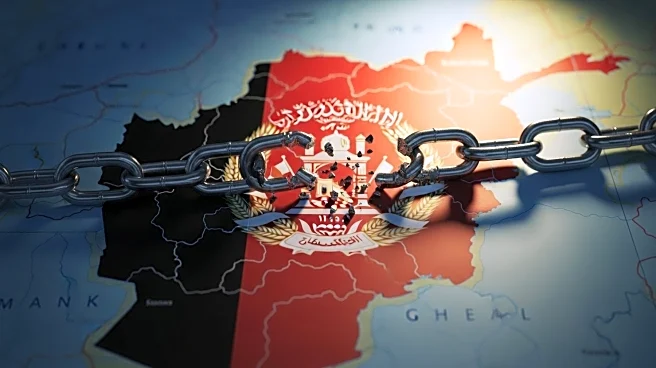What's Happening?
Afghanistan is experiencing a severe internet and telecoms shutdown, entering its second day as the Taliban government enforces a blackout. This action has disrupted nearly all digital and phone links with the outside world, grounding planes and closing businesses in Kabul. The shutdown follows the Taliban's earlier indication of plans to ban fiber-optic internet under their strict interpretation of Islamic law. The blackout has affected visa services, internal communications, and has thrown businesses, government offices, and airports into disarray. The United Nations has called for the immediate restoration of internet access, highlighting the significant harm to Afghan people, including impacts on banking, healthcare, and the isolation of women and girls.
Why It's Important?
The internet blackout in Afghanistan has profound implications for the country's economy and society. It disrupts critical banking and financial systems, exacerbates the isolation of women and girls, and limits access to emergency services and medical care. The shutdown also affects international relations, as it severs communication channels with foreign entities and impacts humanitarian efforts. The Taliban's decision to cut internet access may tighten their control but risks deepening public frustration and emboldening critics. The blackout could also confirm allegations of harboring militants, further complicating regional security dynamics.
What's Next?
The Taliban regime anticipates some connectivity will eventually be restored, albeit at slow speeds and not through fast fiber-optic routes. The internet shutdown could lead to increased public dissatisfaction and potential unrest, as communication remains a vital lifeline for many Afghans. International pressure, particularly from the United Nations, may influence the Taliban to reconsider their stance. However, internal power dynamics within the Taliban could affect the decision-making process, as more pragmatic officials may push for international outreach and restoration of services.
Beyond the Headlines
The internet blackout highlights the ethical and human rights concerns under the Taliban regime. The restriction of communication channels further isolates Afghan women, who have already faced severe limitations on education and employment. The blackout may also reflect internal power struggles within the Taliban, as hard-line leaders impose regressive rules that hamper the regime's emergence from isolation. The decision to cut internet access could backfire, leading to increased scrutiny and criticism from the international community.











